Fresh Start is an environmental cleaning simulator that puts me in the first-person perspective of a faceless, nameless figure outfitted with a peculiar device they use to restore polluted landscapes. The player character is summoned to fifteen different levels spread across the world by the local animals suffering under pollution and its related effects. These summons arrive as postcards, and several reference an organization called C.L.E.A.R. What this acronym stands for and how the group functions goes unexplained. What is clear is what they do: Clean up environments endangered by waste and disaster in a process that is sometimes meditative and sometimes tedious.
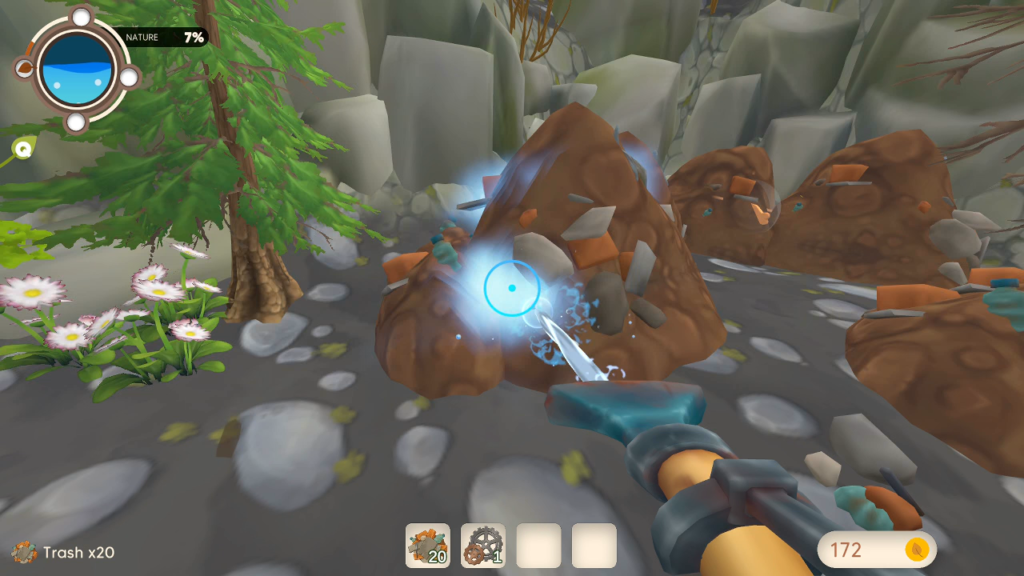
The player character’s primary tool for accomplishing this goal is a handheld mechanical wand. I presume the wand is connected to some kind of pack strapped to the player character’s back, though I never get to see it. I presume this because the wand has two incredible functions: It can pump out a high pressure stream of water, and it can suck in waste like metal scraps, plastic bags and bottles, and a surprising number of bricks. The player character uses these two functions in tandem to provide a fresh start to a succession of environments set on almost every continent.
When the player character arrives in a level, they find it overflowing with giant mud piles so numerous there is barely room to move. Pointing the wand at a mud pile and unleashing the water stream dissolves it in a few seconds. The cleared mud piles leave behind a pile of trash which may be vacuumed up by the wand. I guide the player character through the level, breaking down dozens to hundreds of mud piles then sucking up the trash they leave behind. Clearing mud also reveals dead flowers, bushes, and trees. Watering these restores their vitality, restoring them to life through three stages, each accompanied by a perky and satisfying pop that I never grow tired of hearing. Occasionally the wand’s water supply will run out and must be refilled at a nearby water source. This describes the entirety and extent of Fresh Start’s activities.
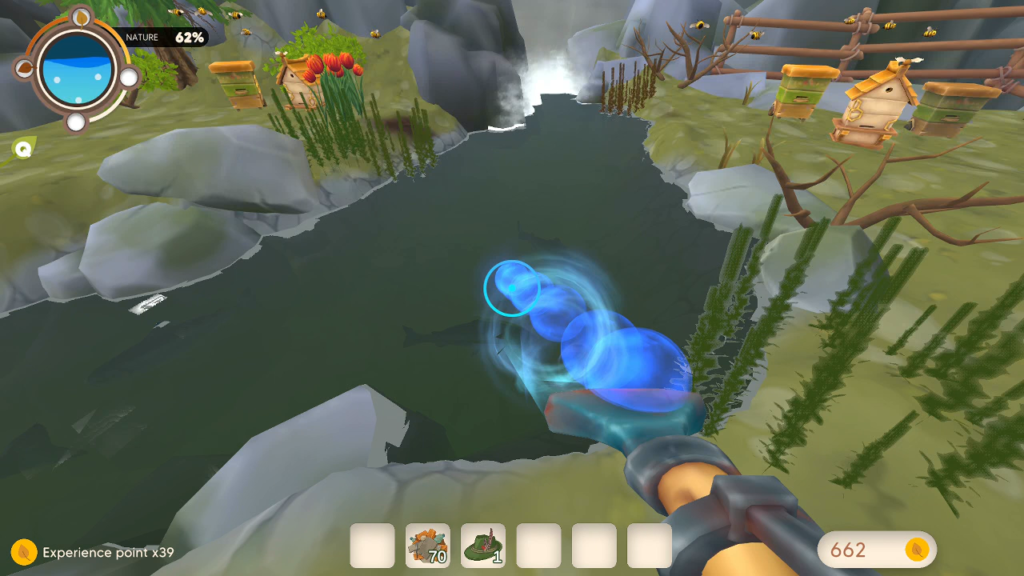
Levels do try to fool me into believing more is happening than blasting mud, sucking trash, and watering plants. Each comes with a checklist of unique quests. A railway station must be rebuilt. Fishing nets must be collected. Oil and acid spills must be vacuumed. In a level seemingly inspired by Australia’s catastrophic 2020 bushfires, burning trees must be extinguished. Sometimes completing a quest is as simple as cleaning up the right place on the map. At other times, a token must be recovered and delivered to a location before the quest will complete. In all cases, the quest’s objectives are buried beneath the mud piles, entwining them all in the steady, pleasant monotony of cleaning mud and vacuuming trash.
When all of a level’s quests are completed and 95% of its mud is cleaned, trash is sucked, and plants are revitalized, then the level is finished and the player character is allowed to continue to the next one.
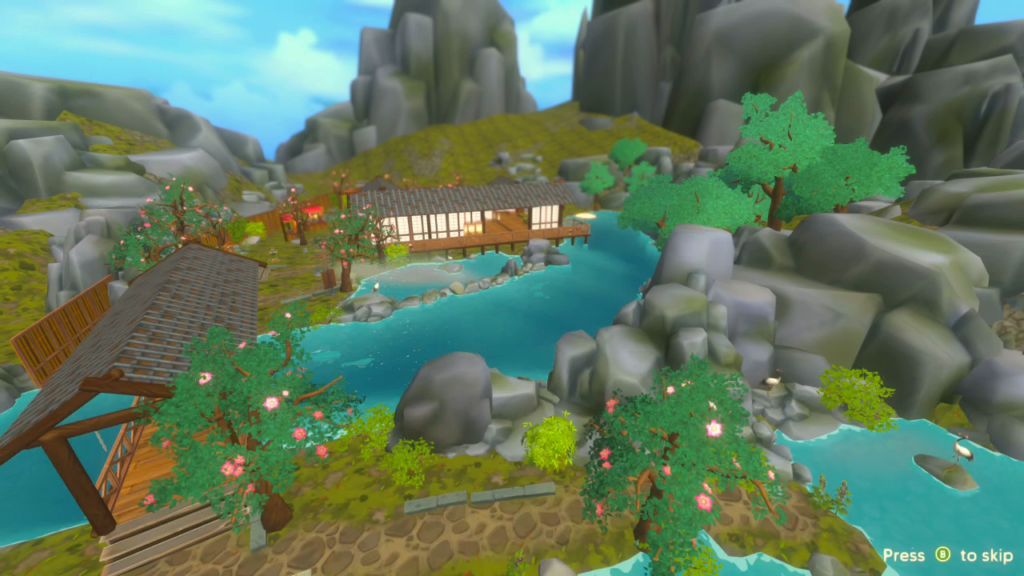
Completing quests and depositing collected trash in recycling machines awards the player character with experience points which may be spent on upgrades to the cleaning machine. One category of upgrade is immediately and obviously useful: The Cleaner Sense, which sends a burst of energy out from the player character that highlights nearby dying plants—except, for some mysterious and arbitrary reason, the flowers. Other upgrades offer utility, like increasing the player character’s movement speed. This is a nice addition, but there are no monsters to dodge past, obstacle courses to cavort through, or time limits to outrun in Fresh Start. There is no pressing need to increase the player character’s movement speed beyond their pleasant amble.
Most of the upgrades have dubious usefulness. Three purport to increase the width of the wand’s water spray and the speed it cleans up mud. I can see the difference in the spray’s width, but it’s the difference between a creek and a brook instead of a creek and a river. Whether the spray is at its starting or its maximum level, it feels like using an eyedropper to water a field. The increased speed at cleaning up mud piles feels similarly inconsequential. Other upgrades let the player character drop machines that remotely clean up mud or trash. These require so much micromanagement they don’t feel any faster than using the wand directly, and they deprive me of that sense of pleasant monotony that produces my most positive feelings. I barely bother with them.

All of the available upgrades are divided into three trees. At the top of each tree are one of the player character’s three ultimate abilities: A wave of water that emerges from the wand, a small tornado that sweeps up all the local trash and deposits it in the player character’s pack, and a magnet that lets them reuse the remote tools without having to pick them up again. These ultimates are so expensive I only accumulate enough experience points to unlock one of them.
I opt for the water wave. The “wave” is an unimpressive low tide that cleans a small space of maybe a few dozen square feet. Since it takes many minutes of sustained water streaming to charge this ability, I end up using it less than ten times total. Each time is a disappointment.
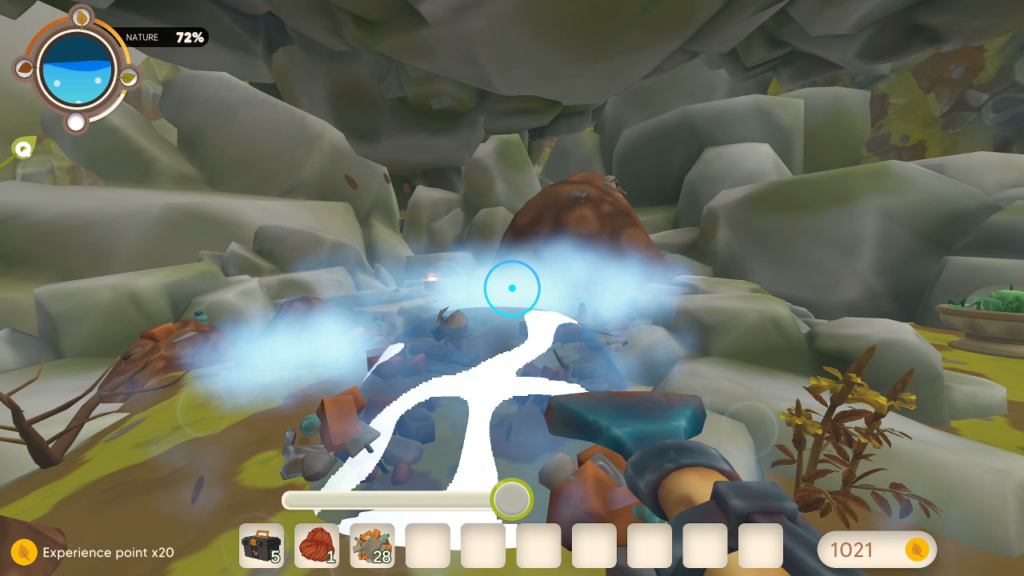
My ability to engage with Fresh Start’s mechanics is stunted by these limitations. It is further hampered by its performance. It looks and plays like a first-person shooter, complete with a traditional twin stick movement and aiming control setup. The sensitivity of these controls defaults to a low setting that would have to move twice as fast to feel sluggish. I tolerate these defaults for only a couple minutes before going into the settings menu to crank the aiming sensitivity. Even at their maximum setting, the speed at which the player character looks in all directions is barely passable. Only the absence of hazards or any necessity to act quickly keeps this flaw from rendering Fresh Start unplayable. Even in the levels that are on fire, the player character can take as long as they need to complete their goals.
My ability to engage with Fresh Start is also limited by its appearance. For a videogame all about cleaning up environments, transforming them from barren and lifeless wastelands into vibrant and flourishing natural systems, the levels the player character visits look broadly the same. A few have obvious cultural indicators to make them stand out. Most could be described as “a forest.” They are devoid of notable color even after all the mud piles have been washed away.
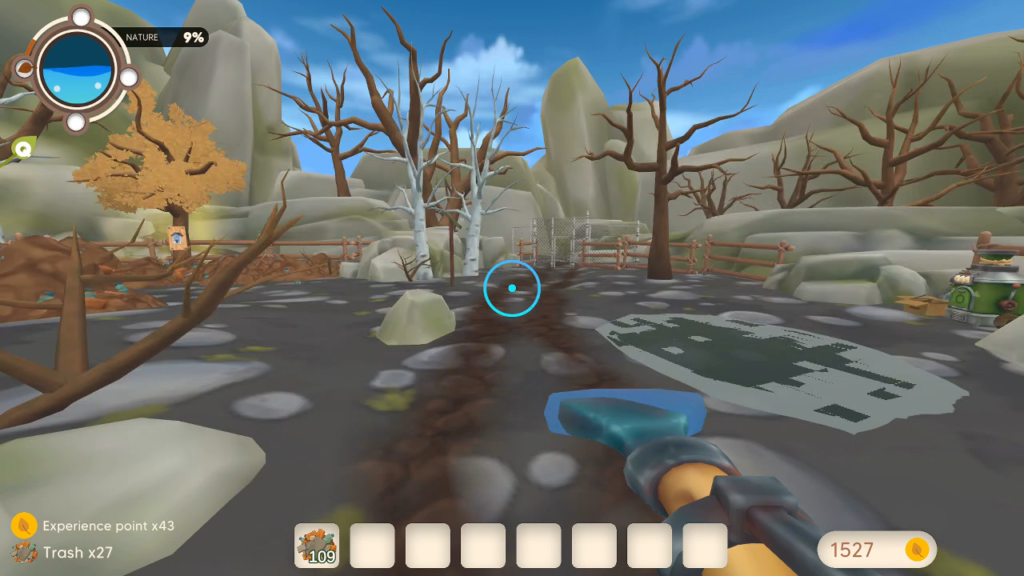
In many instances, levels seem uncertain where they even take place. Many have a name signifying a specific location, like Iceland and the Alps. Many others carry generic names like Rail Station (set on the United States/Canadian border around Montana) and Forest (set on the western edge of Russian Siberia). Other names are lazily non-specific. One level is called Japan. The level preceding it is called Asia, though it seems to be set in southeast China.
Once the player character enters a level, the environments feel eerily still and lifeless. The animals who summon the player character to their homes reappear as the cleanliness meter grows past 35%, 65%, and 95%, but they stand still in a single place. Most have only limited movement, pivoting their heads back and forth or waving a limb. Others are completely still. They feel uncanny and animatronic.

As soon as the word “animatronic” enters my thoughts, my perception of Fresh Start flips on its head. I no longer feel like the player character is traveling the world on behalf of C.L.E.A.R. to clean up animals’ polluted homes. I feel like they are a janitor at Epcot Center, cleaning up exhibits in the World Showcase after an especially horrible holiday weekend. The small, artificial environments filled with cheap, false animals don’t feel like real spaces. They feel like neglected attractions in an underfunded theme park.
I’m frustrated to report so many disappointing experiences with Fresh Start because I believe it is a wonderful concept for a videogame. Too many places on Earth have been damaged by the presence of humans, and a videogame about repairing that damage, no matter how fantastical, could help to raise more awareness about these places. Too much of the execution is botched to effectively communicate this message. The bland environments are filled with too much mud and not enough life, as though what Fresh Start really says is the greatest threat to Earth’s animals and environments is a landslide.

I hesitate to say I am bored by Fresh Start. When I let myself sink into its larger levels, I feel calm satisfaction at accomplishing a tedious task that requires patience and precision. Moment-to-moment, I am enjoying myself amid a steady drip of cleaning tasks. It’s when I look back on the experience as a whole that I recognize how limited it is. Every level is essentially the same. The unique quests meant to make them feel distinct are not varied enough to impart that feeling. The limited customization gained through earning experience points is meaningless when most of the upgrades have little discernible impact on the player character’s performance. The stiff, cold, and lifeless presentation fails to make this videogame about nature feel natural. The satisfaction I gain from a thorough job well done in Fresh Start is fragile and breaks down the more it is examined.